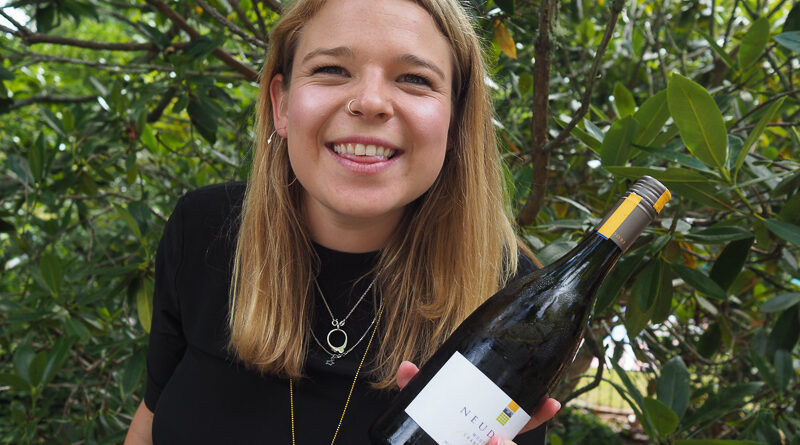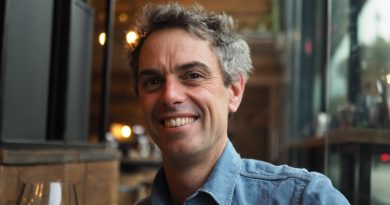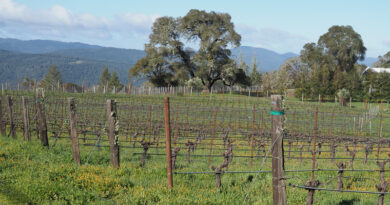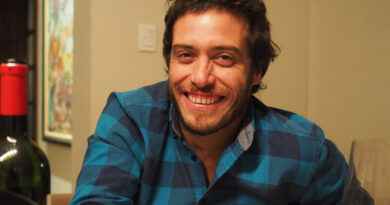Neudorf, one of New Zealand’s top small wineries, with Rosie Finn
On Instagram Live, I caught up with Rosie Finn, who since 2016 has been back in New Zealand working at the family winery, Neudorf, which her mum and dad Tim and Judy Finn established back in the late 1970s. Located in the Nelson region at the top of South Island, over the last four decades Neudorf has gone on to become one of New Zealand’s most celebrated boutique wineries, well known for their Chardonnay and Pinot Noir from the clay-based soils of the Moutere Hills. This is a lightly edited version of our conversation.
Jamie Goode: Can you tell me a bit about Nelson, your region, and also a bit about the history. Your mum and dad were pioneering in the region, weren’t they?
Rosie Finn: The vineyard directly behind me was planted by mum and dad in 1978. The first vineyard in Nelson was planted in 1974 [by Seifried]. Seifried and Neudorf kicked it off. It’s a magical little region: we are surrounded by three national parks – the range behind me is part of the Kahurangi National Park. It is filled with art, great food, pottery, music, wine and cider. It is New Zealand’s only hop growing region. It’s a creative region to be part of. Mum and dad chose this site because of the soil type: he really wanted to grow on clays. Neither are from Nelson, or had been affiliated with the region, but dad found this piece of land with clay soils and that was it: they made the move to the top of South Island.
Putting it in context, New Zealand at the time was not well known for wine.
No, not at all. Dad was finishing his master’s degree in animal behaviour, and at the same time they were looking at bringing viticulture into New Zealand as an industry at the same place. He was introduced to wine at a time when they were designing the industry, and he fell in love with it. That was it for dad. Even Marlborough hadn’t really boomed at that point. Choosing this tiny little plot in Nelson was somewhat crazy. I know I wouldn’t have the bravery to do what they did. It’s interesting talking to people from Europe. The nets going on behind me are going on for their 40th vintage. Vintage 2021 will be 40 years for us, and people say that’s quite young. But in New Zealand terms that’s relatively old.
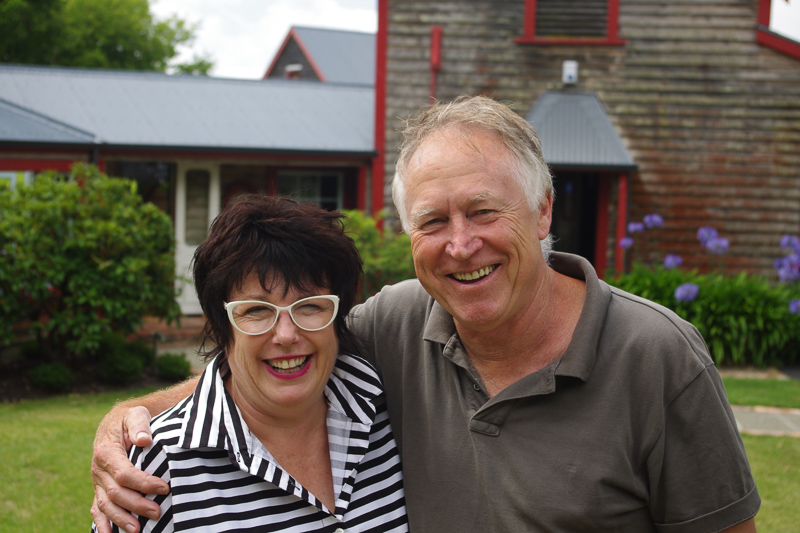
What else is happening in Nelson? Marlborough grew huge, and Nelson started at more or less the same time, but it has stayed small.
There are 26 or 27 family-owned wineries in Nelson. It has a very different landscape to Marlborough. There are two distinctive wine growing regions. Up here we are on the Moutere Hills, which is clay-based soils, and then on the side of the hill you have the Waimea plains, which have free-draining alluvial soils. But we don’t have the expanse of land. When you drive into Marlborough it is expansive. We don’t really have that here, so this has contributed to keeping us little. Small family run businesses have directed Nelson for a long time. It is an interesting region: it is the largest fishing port in Australasia. It feels like a small town but it is quickly growing, and it has changed a lot in the five years since I’ve been home. It is now the home of New Zealand wine exports, too: they all go out of Nelson (from the South Island at least). It is a cool little vibrant town. I was freaking out about moving home but I love it now. I moved home in 2016, so it will be five years this year. Which has just flown by. It feels like I was in London just a month ago.
What’s your role now?
Mum has retired, so I am now director of sales and marketing globally. It’s awesome.
Let’s talk about your vineyards. I can’t remember when it was that I last visited, but I was really impressed by the vineyards. You are farming organically?
Yes. We are on the Home Block now, which is original plantings from 1978, and this is organically farmed. Behind me over here is Rosie’s Block, which is also organically certified. We have been working towards organics for a long time. I think our first certified vintage was 2016, and all of our single-vineyard wines are now certified organic.
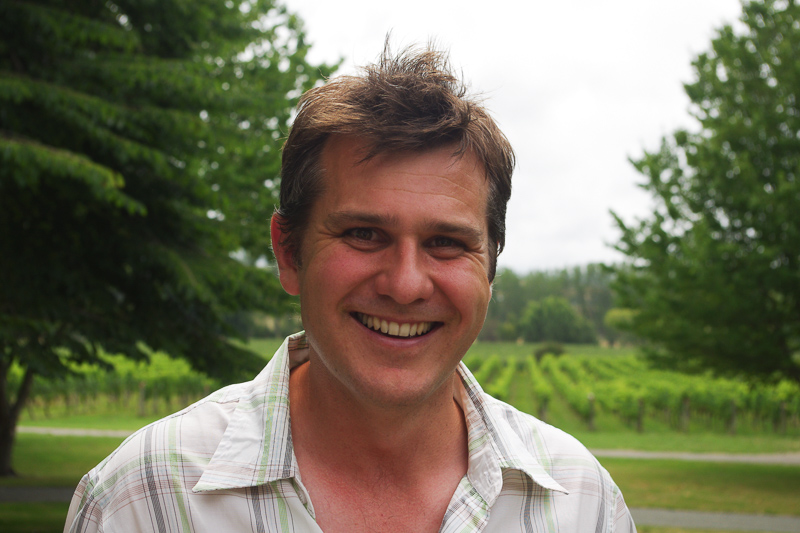
What’s the challenge to doing organics in Nelson?
If you ask Todd [Stevens] our winemaker, he’d probably say learning how to control grass. Nelson has beautiful long sunshine hours, but we have a little bit of rainfall in the hills, so when we get huge grass growth that can be a challenge. My dad has always been obsessed with climate change – he was well ahead of the curve. The idea is to leave this piece of dirt in a better place than what we found it. If we can do that and make great wine at the same time, that’s awesome.
What sort of size are you now in terms of vineyard holdings?
Rosie’s is about 15 hectares, the home block is 9 hectares, and we have a couple of sites where we take some fruit for our Tiri Tiri collection.
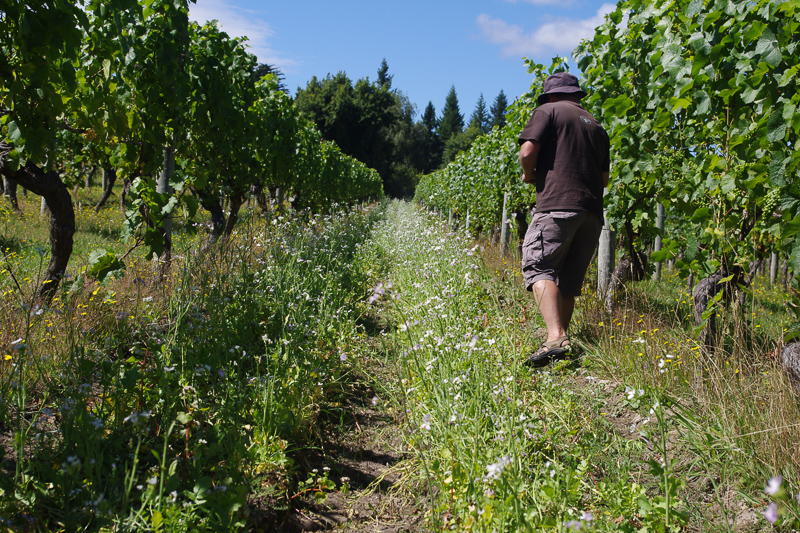
With a small family business, there must be advantages, but there must also be challenges. What are these? And are there certain sizes where wineries work?
I don’t have experience of bigger wineries, but I can talk from my experience. Jude [Finn, Rosie’s mum] had been doing her role for 37 years and knew her job like the back of her hand. They started the business so mum was always in that role. Taking on that position, I don’t know how many times someone said to me ‘big shoes to fill’. But mum and dad still live on site so if I’m really stuck and I’m not sure of the final call, I just go and see Jude. It has been the best hand over I could ask for. Dad has 40 vintages under his belt, and Todd [Stevens, winemaker] is exceptional. Tim and Jude have done a wonderful job of letting us take the reins, but it’s really nice for me knowing that they are there should we need them. The disadvantages? There aren’t too many. It has been a pretty smooth ride so far. Being in a small company the best thing is that decision making is really fast, because the two shareholder directors live on site. If there’s a big thing we want to talk about, a decision is made by lunchtime. I really appreciate that. It makes such a difference when you are trying to run a company in a small place. In times like COVID we have had to make big calls, and being able to do them quickly is fantastic.
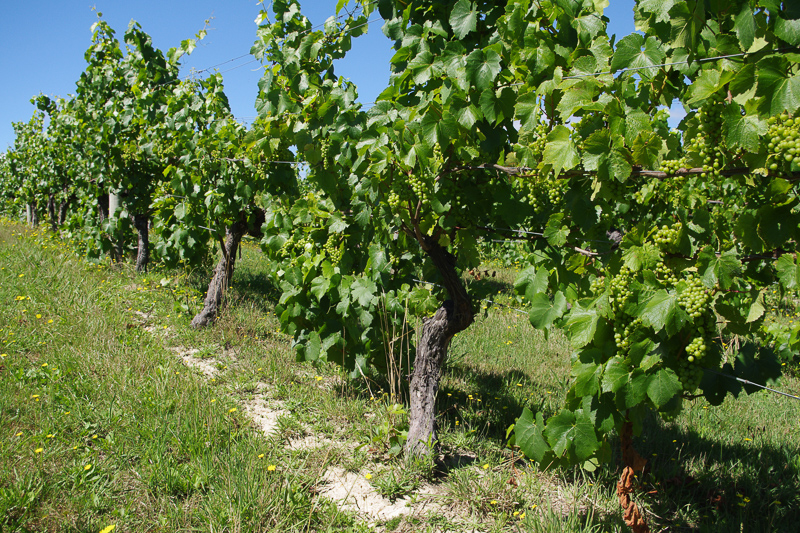
For the New Zealand wine industry more broadly, has the lack of ability to be able to travel to markets been an issue? Is it absolutely essential to be on planes all the time, or has some of that travel in the past been deemed essential by people who like travelling?
I’m probably going to shoot myself in the foot here, Jamie, because one of the absolute joys of my job is travelling, and especially back to the UK. I love the travel aspect of my job and it makes the world feel a lot smaller. This is what I love about the wine industry: it’s so close. But to be perfectly honest, from an environmental perspective and an ease of communication, it has been relatively beneficial [not travelling] in some ways. I have had trips to London where people can’t meet me and I don’t see them for a year. Whereas now I have had three or four trade visits to restaurants or wine shops in London where Bibendum have sent samples to the buyer, the buyer says what time suits, and we tee it up. It is a lot more flexible. While I think that international travel will never fall by the wayside, I think it has become a lot less vital in terms of communication purposes.
We started a big movement to map our carbon footprint a year before last, and I was looking really bad because I do the travel for the company. Now it is brilliant. We have new solar panels so we are just about to become solar run, which is very exciting. There is a big movement within our company to drop our carbon footprint. If we saw a terrible effect by not visiting we’d have to change something, because to remain sustainable you have to sell the wine. But the fact we can do things like this [IG Live] is a game changer and I’m all for it.
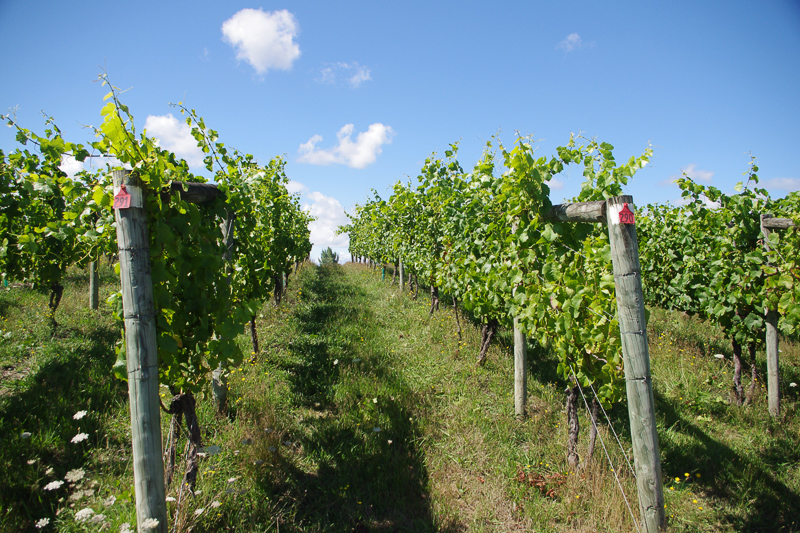
Tell me about your solar panels!
The vineyard is north facing, so on the top of the red wine winery, last week the panels finished going up, and we will have enough solar energy from this to run the whole company, and give some back.
Todd’s latest expense has been an electric forklift.
Are you thinking of electric tractors, too?
Absolutely. They are already on the market. We still have some very good tractors. So we’ll use them through. We needed a new forklift and it wasn’t even a discussion: this will be electric.
I have two wines here. You have revamped your Chardonnay range, yes?
Todd and I sat down and asked, what does the future look like? We wanted a portfolio of Chardonnays to take Neudorf to the world. We have been relying on Moutere Chardonnay, which has put us on the map, and we thought it was time to expand.
I love the home vineyard: the image in my mind is that dad went and dug every hole, and mum planted the vines behind him. This was a real labour of love. Rosie’s Block, which has been on the market for a few years, has been punching well above its weight for some time. We were taking from a couple of sites as well as from Rosie’s for that wine. We were looking at the barrels from Rosie’s and they were absolutely spectacular so we decided it was time to split the portfolio, and have Rosie’s Vineyard as single site and organic, and really explore the differences between the Home Block and Rosie’s. This is what the portfolio is about.
The Home Block Moutere Chardonnay retails at NZ$82, and Rosie’s is just about to be released in March at NZ$45, but this is its first year. We are testing the waters.
The Twenty Five Rows Chardonnay is from the same site, but it is 75% stainless steel and 25% amphora, so it’s pretty much a naked expression of the vineyard.
The amphora is new this vintage? Where did you get them from?
Yes. They are from Spain. We have been making Twenty Five Rows for a few years, and we always made it with the intention of seeing what we could do if we didn’t influence it at all. For five or so years it has been stainless steel. This new amphora thing was a beautiful idea and it involves clay which is what we are all about. We went out and bought an amphora. For the 2020 vintage, we bought another one, so we are looking at 75% amphora for this vintage.
I remember going to a concert at Neudorf. It was the Wellington International Ukelele Orchestra.
Aren’t they wonderful?
It was really fun. Back to the wine. Is Chardonnay your main thing?
Chardonnay and Pinot Noir are the backbone of the business, and what we are most well known for. Nelson has a really interesting climate. We are at the top of the South Island, two hours’ drive west of Marlborough. The Tasman Bay controls Nelson’s climate. Even though we feel a bit inland here, we are only 5 km from the ocean. Nelson’s climate has long sunshine hours, but we don’t get particularly hot days: 30 C would be right up there. This gives us a long, gentle ripening time and we retain acidity in the wines so they are constantly refreshing.
Didn’t Bob Campbell give you 100 points for the Moutere Chardonnay one vintage?
Yes, that was the 2014. It was very exciting and somewhat out of this world. I was living in London at the time and mum rang and said oh my goodness Bob Campbell has just given the Moutere Chardonnay 100 points. They were coming over about a month or so later, and mum said what do you want me to bring from home? I said a bottle of the 2014 Chardonnay, and she said, oh no, there’s none of that left.
Did it make a huge difference?
Yes, he’d never given 100 points before in his career, and I think this is what made it. We were deeply flattered. The strange thing was he gave the following vintage 98 points and people went, ahhh.
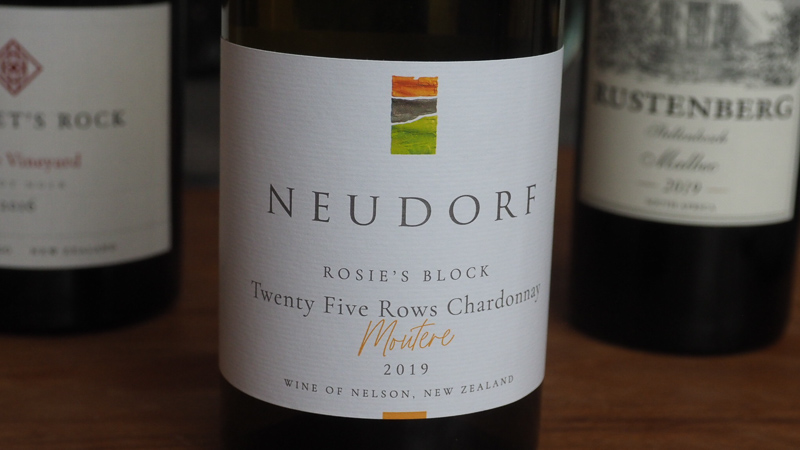
There’s new packaging on these Chardonnays.
Yes, that was my lockdown project.
I like what you’ve done on the back label: three words. The Moutere Chardonnay is ‘aristocratic’, ‘classic’, ‘intelligent’. The Twenty Five Rows is ‘sleek’, ‘vivacious’ and ‘cohesive’. I like this: it is a really nice way of doing things.
This came from my time in London, working on the floor of restaurants. I had a basic knowledge of wine. People would ask me questions, and so often the back label would say something that didn’t really tell you about the wine. When I got back to Neudorf I said, having worked on the floor and held a bottle of wine, I reckon we need to have the basic tech notes, and three words to describe it. We tried it for a vintage and it worked quite well, so it stuck around. On the side of the label it says Moutere clay gravels, single vineyard, dry farmed, low cropping, hand harvested, wild ferment, natural spring malo, barrel fermented 15% new oak, unfined and vegan. I think that’s a great amount of information to be able to work with.
Also I like that you have lighter bottles. Is that deliberate?
Absolutely. Everything comes in lightweight. It was a deliberate choice.
Growing up with the family winery, as an only child, the expectation might be at some stage that this will be yours. How did you deal with this? What was your journey like? Were you always thinking of coming back?
I had to go off and do my own thing. Right through my teens I never thought I was going to be in the industry. It was mum and dad’s thing, and they were great at it. I was terrible at science, I had put myself into this box that if I’m not good at science, I’m not going to be a winemaker, and therefore I’m not going to be in the industry. It took me a long time to realise that there is so much more to the wine industry than just being a winemaker. I went and studied design and photography in Wellington. The day I graduated, I flew out to London. When I got to London I realised I didn’t have a job, a flat, money – anything. I just wanted to be there. And the gorgeous wonderful inspiring Melanie Brown got in touch, and I went and had a coffee with her. She was about to launch the New Zealand Cellar online [now Specialist Cellars], and I could do a bit of the website stuff, and I got absolutely hooked. I was always learning, and I had the best two years with Mel. I remember one day, specifically, where I bought Decanter instead of Vogue. I thought: something has changed in me. When the time came to move home I remember calling mum and dad and saying don’t do anything, I’m coming home, I’m not sure when, but I will be there.
It’s a lovely journey.
I love that it is on my own terms. Tim and Jude didn’t do what their parents did – they did this crazy thing and planted a vineyard, and I was really appreciative that they didn’t put any pressure on me. Now I use my degree every single day, and I’m grateful for that. I have no regrets either way.
What changes are you going to implement? Do you have an eye to the future? What might you like to do differently?
Todd and I work closely together, and I’m lucky because he is an absolute visionary. He’s got a massively strategic mind. We have started off lightly: we have updated labels and have expanded the portfolio to four Chardonnays, two Pinots, two Pinot Gris, Riesling, Albariño and rosé. We don’t want to get any bigger at this stage. The big moves will be toward carbon mapping and organics. There will be small things.
Gamay?
Gamay would be very cool. I have a piece of land we are about to replant. Maybe we should put Gamay in.
Tell me about Albariño?
We have a little point at the end of Rosie’s Block and we had some room to experiment, so we planted half a hectare of Albariño. We have done six or seven vintages with it, and we really like it. It is really harmonious with the Nelson region: we eat a lot of seafood and Albariño is a perfect match with that. It is also beautifully resistant to tough vintages. Dad wanted something that could be a bit of an insurance policy moving forward. We have just planted another 1.5 hectares.
THE WINES
Neudorf Rosie’s Block Twenty Five Rows Chardonnay 2019 Moutere, Nelson, New Zealand
13.5% alcohol. This is unoaked, but a portion of the wine is fermented and aged in clay amphora (beginning with this vintage). It’s gently aromatic with notes of pear and sweet citrus. The palate is pure and nicely poised with a nice mineral, slightly stony undercurrent and more sweet pear fruit, as well as lemon and mandarin. It’s a very fine, pure expression of Chardonnay unencumbered by oak. Expect it to put on a bit of weight with time in bottle, but drinking nicely now. 93/100 (02/21)
Neudorf Rosie’s Block Chardonnay 2017 Nelson, New Zealand
13.5% alcohol. This is a lovely precise Chardonnay with subtle toast, some bright mineral notes, and lovely bright lemony fruit. There’s some subtle grapefruit and pear, but the main drive is a crystalline, precise lemony focus. Has really nice balance, with good acidity. Top Kiwi Chardonnay. 94/100 (08/19)
Neudorf Rosie’s Block Chardonnay 2018 Nelson, New Zealand
13% alcohol. Moutere clay gravel soils, wild ferment in 15% new oak. A taut, intense, focused expression of Chardonnay with a mineral core and tight lemon fruit, together with subtle creamy hints, a twist of hazelnut and subtle pineapple exoticism. There’s great energy to this wine, which is tightly furled with layers of flavour that emerge in the glass and mouth. A serious, focused effort of real appeal. 94/100 (06/19)
Neudorf Moutere Home Block Chardonnay 2018 Nelson, New Zealand
13% alcohol. Organically farmed, wild ferment, 15% new oak. Taut and restrained with very fine citrus fruit, and subtle pineapple and apricot hints adding some exotic detail. This is linear and fruit driven, with the oak hardly apparent at all, just adding a slight nutty twist on the finish. It’s really mineral and has a subtle creaminess: together these traits make me think of top Chablis. Real finesse: it’s a little lighter than other vintages, but still has lots of flavour. 94/100 (11/19)
Neudorf Home Block Chardonnay 2019 Moutere, Nelson, New Zealand
13.5% alcohol. This is lively and intense, with great concentration and zippy acidity. There’s lovely spice laden pear and lemon fruit, with some overtones of pineapple and hazelnut. Youthful and taut, it’s quite unfurled and chiselled at the moment, but it has a lot of development ahead of it. Beautifully focused with a bright grapefruit and pineapple finish. It’s quite hard to prise apart the individual components at the moment. 94/100 (02/21)
Neudorf Tom’s Block Pinot Noir 2017 Nelson, New Zealand
13.5% alcohol. Moutere clay/gravel soils. Wild ferment and spring malolactic, matured in barrels (20% new oak). This is bright and expressive, with sweet ripe black cherry and blackberry fruit with hints of tar and spice. There’s a lovely crunchy structure here: it’s really fruity and pretty with some cranberry brightness as well as a bit of fruity depth. Great balance to this wine, which is drinking perfectly now. 93/100 (04/20)
Neudorf Tom’s Block Pinot Noir 2016 Nelson, New Zealand
13.5% alcohol. Hand-picked from clay/gravel slopes of Nelson’s Moutere subregion, and bottled unfined and unfiltered. It’s fresh and aromatic with a hint of tar under the juicy cherry and plum fruit, with some floral hints. The palate is supple, juicy and easy, with sweet cherry fruit and also a hint of strawberry, hemmed in by some lively spicy notes and a bit of tarry grip. It’s a lovely expression of Nelson Pinot Noir, all bright and frilly and nervy, jumping around a bit on the palate. Really expressive. 92/100 (01/21)
Neudorf Moutere Pinot Noir 2017 Nelson, New Zealand
13.5% alcohol. Organically farmed. 18% whole cluster, 22% new oak, finishing at a high pH of 3.85. This is silky and elegant, with very fine red cherries and plums, with amazing finesse in the mouth. Floral and fine, with a fine-grained structure. It’s not a big wine, but it’s beautifully proportioned and light on extraction, with the result that it’s superbly drinkable, but also with some seriousness. Subtle spice and earth notes supporting the beautifully poised cherry fruit. Such harmony and joy here, but drink now, don’t age. 95/100
Neudorf Moutere Riesling Dry 2019 Nelson, New Zealand
12.5% alcohol. 90% tank, 10% old barrel. Limey and precise with nice pear and white peach richness under the core of citrus fruit. There’s a mandarin framing to the fruit, and it has prettiness combined with seriousness, with a chalky graininess to the acidity. A really lovely wine showing real precision. 93/100 (11/19)
Neudorf Moutere Pinot Gris 2019 Nelson, New Zealand
13.5% alcohol. Moutere clay/gravel soils. 30% fermented in old barrels. This is a richly flavoured Pinot Gris with sweet pear and mandarin fruit and a nice stony acid line, showing texture and balance. This is a Pinot Gris with flavour and depth. 91/100 (04/20)
Neudorf Moutere Albariño 2019 Nelson, New Zealand
13% alcohol. From low-cropping wines on Moutere clay gravels. Very distinctive, laser-sharp nose of mandarin, honeysuckle and apricot, with a twist of fennel. The palate is bone dry and vivid with juicy, stony, focused lemony fruit with a herby twist and some saline/seaweed notes. Bony and acidic, this is an intriguing take on Albariño with a Kiwi twist. Very gastronomic. 92/100 (01/20)
Neudorf Sauvignon Blanc 2018 Nelson, New Zealand
13% alcohol. 40% fermented in old barrels, single vineyard, alluvial gravels, wild yeast. This is pure, quite linear and citrussy with some subtle apple and nut complexity. There’s just a hint of green pepper and quince, and a lovely harmony and balance on the palate. Finishes long and detailed. 91/100 (03/19)
Neudorf Tiritiri Chardonnay 2019 Nelson, New Zealand
13.5% alcohol. This is a new Chardonnay from Neudorf that fills a price-point gap vacated by Rosie’s Block, which has now been elevated to be a peer with the Home Block Moutere Chardonnay. It’s from Moutere clay soils, and also has some fruit from Rosie’s block in it, and retails in New Zealand for $27. This is pretty serious: there’s a lovely mineral, reductive framing to the crisp citrus fruit. But there’s also some richness here, with pear and peach notes, as well as some apple skin, lying over the taut lemony notes. There’s a real harmony to this wine: all the fruit is from Moutere clays, and it delivers that distinctive Neudorf house style at a brilliant price. 93/100 (11/20)
Neudorf Tiritiri Pinot Gris 2019 Nelson, New Zealand
13.5% alcohol. This is quite lovely, even at this very youthful stage. It shows nice texture with a bit of yellow plum and pear, framed by appealing mandarin notes. There’s a luxurious texture here: it’s a wine without much treble or bass, but a lovely mid-palate line. Quite silky and smooth, but with a dancing, tangy brightness on the finish. This is a really good example of Pinot Gris that’s dry and focused but still has some personality. 92/100 (01/20)
Neudorf Tiritiri Sauvignon Blanc 2019 Nelson, New Zealand
13% alcohol. This is fresh and bright with appealing citrus fruit, a subtle hint of mandarin and passionfruit, and a delicate mouthfeel. This is fruity but with lovely finesse, showing real focus and detail. A restrained, quite fine expression of Sauvignon. 90/100 (01/20)
UK agent Bibendum Wine
Find these wines with wine-searcher.com

